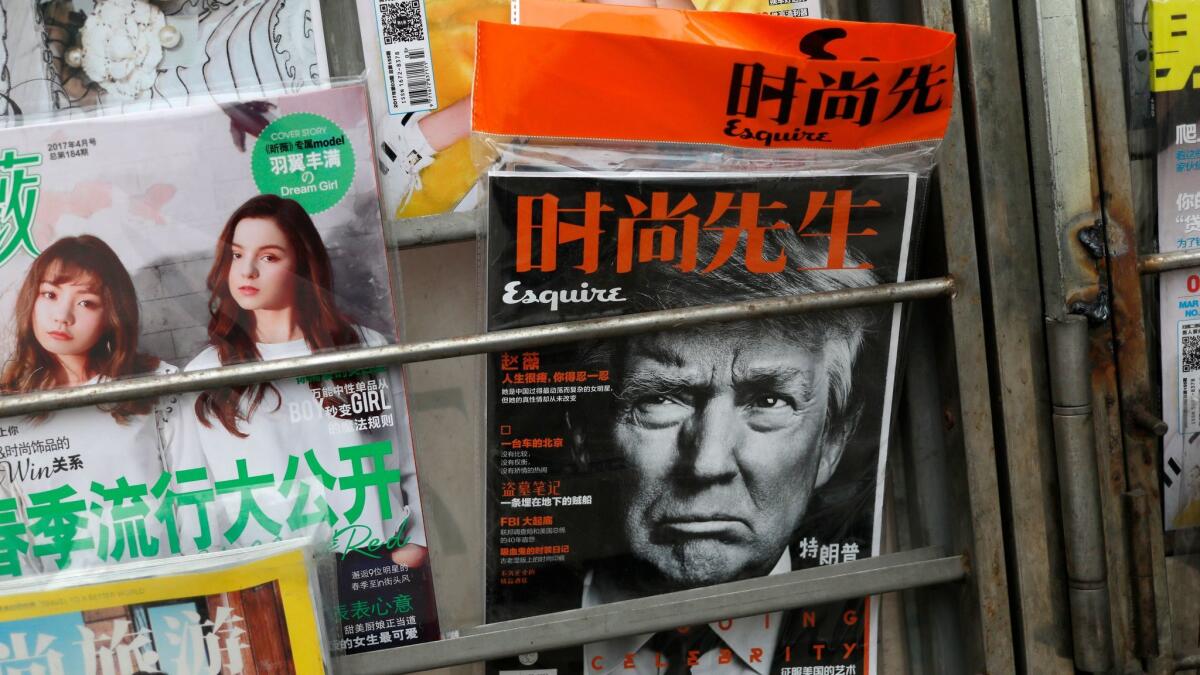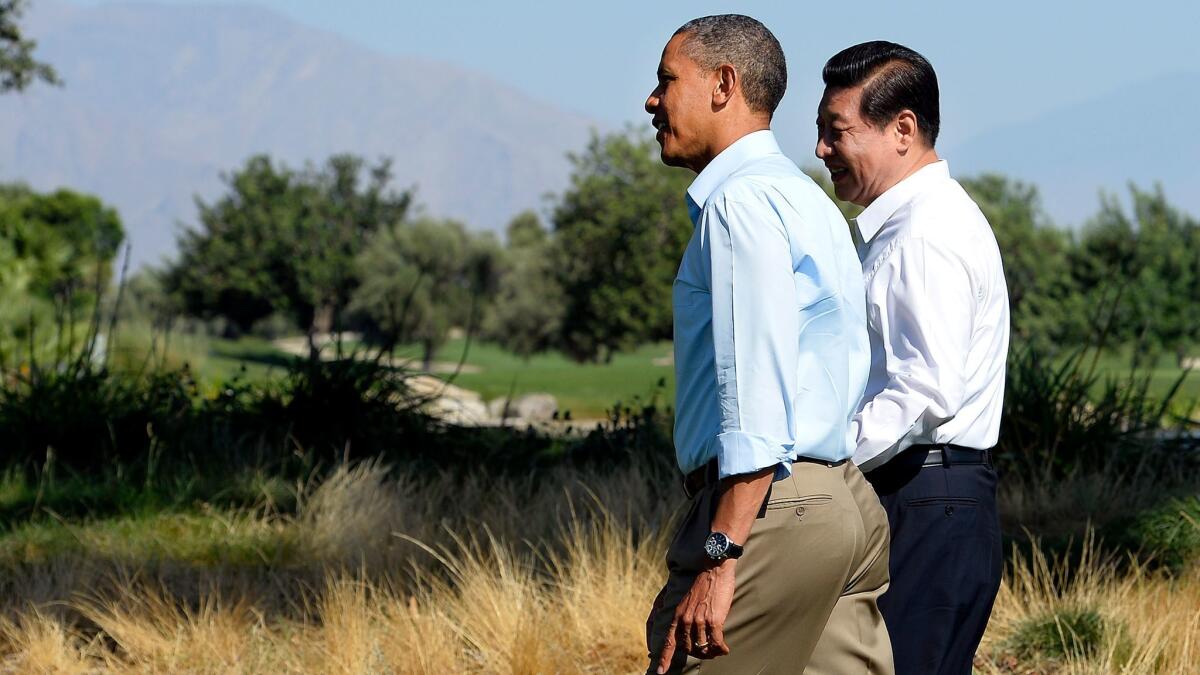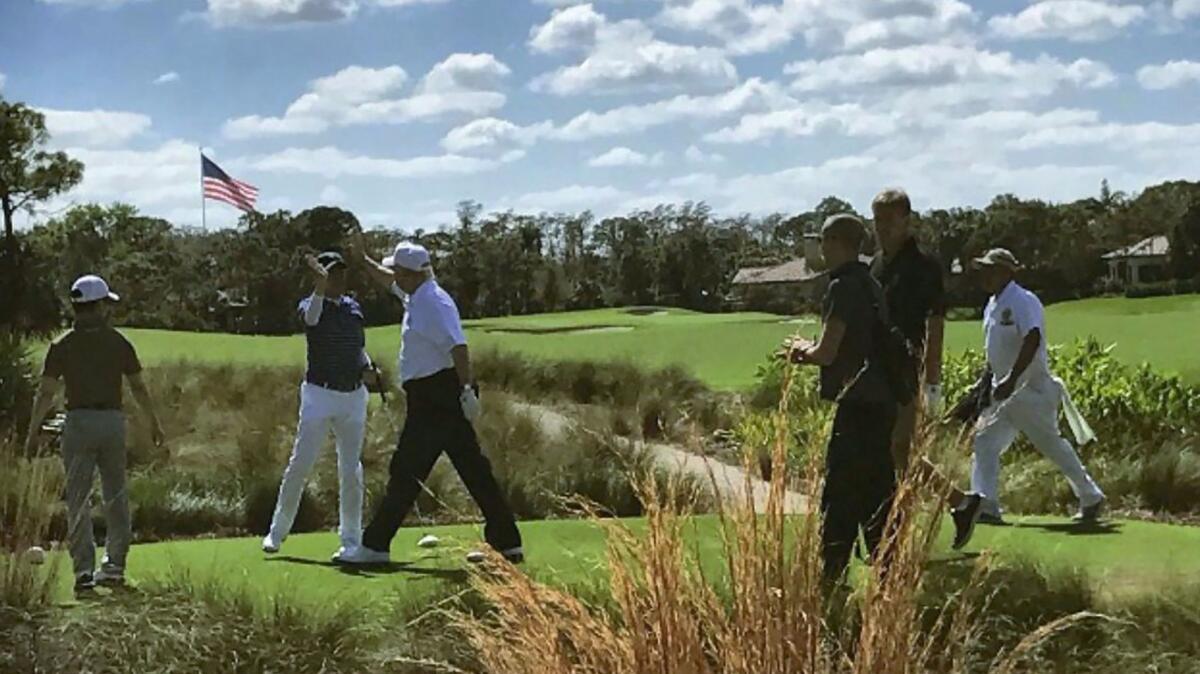As he gets ready to meet Trump in Florida, China’s Xi Jinping has a lot to worry about

Donald Trump will meet with Chinese president Xi Jinping this week. (April 4, 2017) (Sign up for our free video newsletter here http://bit.ly/2n6VKPR)
Reporting from BEIJING — Chinese President Xi Jinping is a man of protocol. Xi, the country’s most powerful leader in decades, is rarely photographed without his back straight, his hair bottle black, and his expression a taut half-smile. He’s virtually never quoted beyond scripted exchanges, most in Communist Party jargon. His personal life is hidden in shadows.
President Trump, by contrast, is known as a provocateur, off-the-cuff and unpredictable. So in advance of Xi’s meeting with Trump at the president’s Mar-a-Lago resort in Florida on Thursday and Friday — a first for the two leaders — the Chinese government is deeply on edge.
For the record:
8:45 a.m. April 4, 2017An earlier version of this article stated that President Trump refused to shake German Chancellor Angela Merkel’s hand. He did not shake her hand during an Oval Office photo opportunity, but the two did shake hands elsewhere during her White House visit.
The meeting could set the tone for the next several years of U.S.-China relations, and allow the two leaders to square each other up on issues including North Korea and global trade.
For Chinese officials, some of Trump’s previous interactions with foreign leaders may raise red flags. The president reportedly cut short a heated phone call with Australian Prime Minister Malcolm Turnbull, and declined to shake German Chancellor Angela Merkel’s hand during an Oval Office photo op.

“Xi Jinping does not want to be seen as being bullied or embarrassed by President Trump,” said Paul Haenle, director of the Carnegie-Tsinghua Center in Beijing and a former China affairs director on the National Security Council during the George W. Bush and Obama administrations. “The Chinese are masterful at scripting these kinds of interactions, but Trump cannot be counted on to follow a script.”
Trump, who said during his campaign that China was “raping” the U.S. economically, tweeted on Friday that the meeting “will be a very difficult one” in regard to trade issues. His administration is preparing a major arms deal with Taiwan, a self-governing island that China considers its sovereign territory.
And on March 28, North Korea experts, citing satellite imagery, said that North Korea may be preparing to test another nuclear device, raising the stakes for an already tense showdown over how to handle the isolated nation’s budding nuclear program.
Yet Xi’s greater concerns for the meeting are almost certainly domestic. The Communist Party is preparing for a major leadership reshuffle at its 19th party congress in November, when Xi is expected to further consolidate power.
Xi will need a strong domestic economy — and considerable political support — to ensure that things go his way. A fallout in U.S.-China relations could jeopardize his ambitions.
“Despite all of the concern and anxiety about the visit in China, I also think there is a high degree of confidence in Beijing,” Haenle said. “His decision to make the visit speaks to his confidence in his ability to perform in such a high-stakes environment, even to out-trump Trump in whatever negotiation the White House is seeking.”
Trump’s perceived volatility could play into Xi’s hands. Last year, party leaders named Xi a “core leader” — a rank his predecessors Hu Jintao and Jiang Zemin failed to achieve — citing an “uncertain external environment,” among other factors.
Trump has signaled that the meeting will have elements of a showdown. During his campaign, he threatened to designate China a currency manipulator and impose a 45% tariff on Chinese imports. (He has done neither). On Friday, he signed two executive actions to launch reviews of U.S. trade policy.
“We’re going to get these bad trade deals straightened out,” he said.
China will probably grant Trump a minor economic concession at the summit, experts say, handing the U.S. president a publicity-friendly victory and reassuring the world that its most important bilateral relationship remains intact. Vice Foreign Minister Zheng Zeguang said Friday that “there is indeed a lot we can do on economics and trade.”
Yet major breakthroughs are unlikely, especially on North Korea, which is developing nuclear weapons that may soon be capable of reaching the continental U.S.
In an interview with the Financial Times published Sunday, Trump said that he could “totally” address North Korean issues without China’s help. “China will either decide to help us with North Korea, or they won’t,” he said. “And if they do that will be very good for China, and if they don’t it won’t be good for anyone.”
The remark is almost certain to provoke Chinese leaders, who worry that political instability in Pyongyang could send a flood of refugees into northeast China and push U.S.-friendly forces up to Beijing’s doorstep. China is the North’s main trading partner and only major ally, but lacks absolute control over Pyongyang. Experts say that it’s unlikely to change its mind.
“Xi Jinping and Trump do not want to spoil this summit,” said Shi Yinhong, a professor of international relations at People’s University in Beijing. “If after the summit, Trump launches punitive measures against China, whether the issue is trade or North Korea, China can tell its people, this is Donald Trump. We are prepared. And both sides have already used the basic tools of bilateral relations.”
The summit will carry echoes of an informal summit between Xi and Obama in 2013 at the Sunnylands resort in Rancho Mirage, Calif., where the two men bonded over long walks and a steak dinner. It will also harken back to Trump’s two-day meeting in February with Japanese Prime Minister Shinzo Abe at Mar-a-Lago, where they played a round of golf.
But Xi will not likely play golf — he has cracked down on the sport in China as part of a massive anti-graft campaign. Nor will he be staying at Mar-a-Lago itself, opting instead for the Eau Palm Beach Resort & Spa nearby, according to local media.

For all the differences between the two men, there are ways in which they may be simpatico.
“There are some shared personal characteristics between the Trump administration and the Chinese government,” said Elizabeth Economy, a China expert at the Council on Foreign Relations. “They both have a desire to rely on a small circle of advisors. They reach around the political elites in an attempt to communicate directly with the people to foster populism.”

She and other analysts also point to Trump’s disinterest in pushing a human rights agenda.
“He has a value-free version of how you interact with other leaders that the Chinese could find quite welcome,” said Orville Schell, director of the Center on U.S.-China Relations at the Asia Society in New York.
And Trump’s threats to withdraw from the Paris agreement on climate change have had the side effect of elevating China’s standing.
“It has allowed Xi Jinping to step up to the plate and assert China’s world leadership,” said Economy. And unlike other world leaders, such as Germany’s Merkel, who has been discomfited by Trump, Xi might find familiarity in the insularity of an administration run largely by tycoons and family members.
So while Trump’s State Department has yet to appoint an assistant secretary of State for East Asia, Chinese officials are said to see Jared Kushner, Trump’s son-in-law, as their most reliable line to the president, despite his lack of previous government experience.
Kushner’s ascendance may seem normal to Chinese officials, given their government’s dominance in recent years by “princelings,’’ descendants and relatives of past Chinese Communist Party leaders. Xi himself is the son of the late Xi Zhongxun, a one-time ally of Mao Tse-tung.
A Chinese official told the Los Angeles Times last week that Beijing is anxious for the meeting to attract positive coverage, citing Beijing’s desire to maintain continuity in the U.S.-China relationship. The official requested anonymity, citing the sensitivity of the topic.
Bonnie Glaser, a senior advisor for Asia at the Center for Strategic and International Studies in Washington, tweeted that the China Daily, a state-run, English-language newspaper, requested that she submit an opinion piece focused on “mutual respect, cooperation” and “win-win ahead of conflict and confrontation.”
“This is the most explicit such email I have ever received,” she said in an interview. “It’s rare that the Chinese media solicits op-eds — except for [the nationalist tabloid] Global Times, and they have never provided such instructions.”
Chinese state media have reported on the preparations only with extreme restraint. On Monday, the state-run New China News Agency’s website featured only one, 3-day-old story on the topic, about White House spokesman Sean Spicer’s statement that Trump “looks forward” to the visit.
Several Beijing residents said Monday that they were previously unaware of the meeting, but hoped it would go well.
Luan Yang, 27, a corporate trainer, said he hoped that Trump and Xi would come to an understanding on North Korea. “I am from northeastern China, which is adjacent to North Korea, so I really care about the safety of this region,” he said. “People back in my hometown all worry about the possibility of a regional conflict, or war on Korean peninsula.”
Others were skeptical. “I never deny President Trump’s intelligence, him being a huge, successful businessman,” said a 26-year-old accountant who, wary of discussing politics with a foreign reporter, gave only his surname, Liu. “When compared with our leader, I think he may not have the political intelligence to be president of such a great nation.”
Special correspondent Jessica Meyers and Gaochao Zhang in The Times’ Beijing bureau and Times staff writer Barbara Demick in New York contributed to this report.
For more news from Asia, follow @JRKaiman on Twitter
ALSO
At Trump’s EPA, going to work can be an act of defiance
White House officials offer change to failed healthcare bill -- but is it enough?
Editorial series: Our Dishonest President
More to Read
Sign up for Essential California
The most important California stories and recommendations in your inbox every morning.
You may occasionally receive promotional content from the Los Angeles Times.










